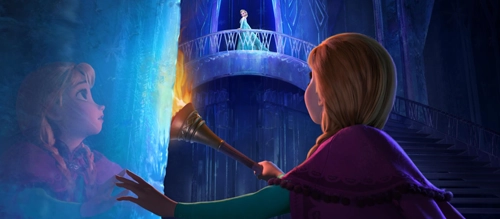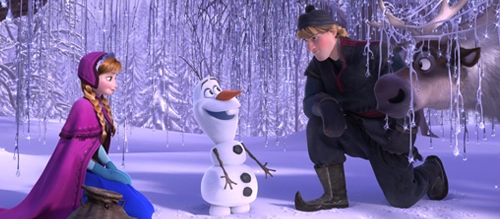‘Frozen’ at 10 – Review

Frozen (2013)
Directors: Chris Buck, Jennifer Lee
Screenwriter: Jennifer Lee
Starring: Kristen Bell, Idina Menzel, Jonathan Groff, Josh Gad, Santino Fontana, Alan Tudyk
A frozen tundra reveals itself under a dramatic score inspired by Sámi-style singing. A world of jagged ice and frost sparkles under the Aurora Borealis. This is a world of magic, made apparent immediately by the children playing. A young princess, Elsa (Eva Bella) can wield snow from her fingertips. Her non-magical sister only sees the joy in this – gone are the themes of female jealousy that were once a Disney mainstay.
But the joy turns sour as Elsa strikes Anna (Livvy Stubenrauch) with an errant ice surge. Once the kingdom’s magical trolls are consulted and Anna is saved, it is decided that the only thing to do is wipe Anna’s memory and hide Elsa’s gift. Elsa is forced into a life of isolation, concealing her true power. After her parent’s death Anna also becomes subjected to this lonely way of living.
Now Spring, Anna (Kristen Bell) and Elsa (Idina Menzel) are grown. They wake equally giddy and nervous that it is coronation day, and their secretive castle has to open its gates to present its new ruler, Queen Elsa (Idina Menzel), to the surrounding kingdoms. Two young women without a King around should be easy to take advantage of. Many dignitaries seem to think so anyway.
The stress of the evening affects the sisters in quite different ways. Princess Anna (Kristen Bell) falls head over heels in love with Prince Hans (Santino Fontana), and Elsa (Idina Menzel) goes on an ice spewing rampage, buries Arundel in a thick blanket of snow, and runs into the forest without a coat. Though, rumour is, the cold doesn’t bother her anyway.
Anna (Kristen Bell) entrusts the kingdom to Hans (Santino Fontana) as she strides out into the snow drifts to search for her sister. A chance meeting with ice merchant, Kristoff (Jonathan Groff) changes the course of her journey and of her life.
Remarkably, Frozen (2013) was the first Disney film to be directed by a woman. Jennifer Lee wrote the screenplay and joint-directed (alongside Chris Buck) both Frozen and Frozen II. These films made her the first woman to direct a film that made over $1billion. And Frozen attracted awards like moss on a rock troll’s behind.
Wreck-It Ralph (2012) was Lee’s first screenplay, and was a very clear indicator of Lee’s ability to write Disney princesses with a difference. Vanelope is more like Elsa than most other Disney princesses before her. Both have a potentially dangerous trait that threatens those they love, both need to accept themselves and embrace their power. Both choose to live alone in a castle of their own design.
There is no doubt that Frozen has been an unmitigated success. In fact, the only animated Disney film to beat it at the box office is its own sequel. The franchise has spawned short films, a mini LEGO series, more merchandise than anyone thought possible, a West End Show, and a critically acclaimed sequel (which is arguably better). Frozen became a Disney classic overnight, and it remains as popular as it ever was.

There are many reasons why Frozen appeals to audiences so much. Obviously, beautiful animation, humorous animal (or non-human) sidekicks, adult jokes flying over kids’ heads, and belting tunes are all to be expected of a Disney endeavour. But there is something about Frozen that gives it an edge over its Disney counterparts and has given it this remarkable staying power.
Perhaps it was the decision to have two female protagonists? The traditional fairy tales of yesteryear with damsels in distress are out of vogue. Yes there is distress in Frozen, but these damsels are going to sort it out by themselves. The non-prince charming, Kristoff (Jonathan Groff) is a hugely likeable love interest, but he is not there to fix Anna’s (Kristen Bell) problems, and no one but Anna can save Elsa (Idina Menzel).
By having two female protagonists, Disney have allowed the more traditionally klutzy, hopeful romantic Anna to tick the boxes for fans nostalgic of the golden era. While Elsa is aromantic, empowered, a warrior. She just has to learn to love and trust. By splintering the facets of a traditional Disney princess, the creative team managed to create something with a wider appeal.
Disney has always been divided into two distinct categories: princess stories marketed at girls, and non-human (cars, toys, animals, elements) stories marketed at both girls and boys. Even with the more modern attitudes of audiences today this hasn’t really changed. If you look at it cynically, girls can be expected to enjoy stories with boys in while boys are not expected to enjoy the stories of girls. While the leads are women in Frozen, there is a strong supporting cast of male characters. Roguish Kristoff, reindeer Sven and magical snowman Olaf (Josh Gad – a man whose expressive and distinctive voice was made for animation) add humour and allow the film to be marketed at both boys and girls. There are monsters, wolves and bogey jokes aplenty for those who are less interested in love and all that mushy stuff.
Another strength of the film is the moving part of the villain. Up to the high note of “Let it Go”, we would be forgiven for thinking perhaps Elsa is the baddie. She doesn’t let Anna live her life, curses a kingdom to freeze to death, and sculpts ice weapons with a glint in her eye. The twist in Frozen, as the audience realises where the real threat lies, is up there with The Sixth Sense or The Usual Suspects. Nearly.
The past decade has seen Disney (and Disney Pixar) films shift to reflect the more progressive tastes of its audiences. Big Hero Six (2014), Inside Out (2015), Moana (2016), Luca (2021), Encanto (2021), and Turning Red (2022) are all coming-of-age stories that explore complex themes of grief, self-worth, difference, and acceptance, with barely a whisper of a love interest among them. While huge successes, none of them have managed the dizzying heights of Elsa’s success. But it is a fair suggestion that Elsa paved the way for these films of empowerment and learning to love yourself.
Frozen is a universal film with themes that are far reaching and enduring. Elsa shot to the top spot, and no matter what she says, she’s showing no signs of letting it go.
Score: 20/24

